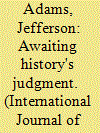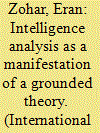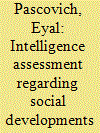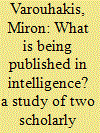|
|
|
Sort Order |
|
|
|
Items / Page
|
|
|
|
|
|
|
| Srl | Item |
| 1 |
ID:
119420


|
|
|
|
|
| Publication |
2013.
|
| Summary/Abstract |
On 10 June 2000, a group of roughly 200 mourners assembled at the Zentralfriedhof Berlin-Friedrichsfelde, the traditional resting place for those belonging to Germany's Communist pantheon beginning with Rosa Luxemburg and Karl Liebknecht. The occasion was the burial of Erich Mielke, the longstanding head of East Germany's Ministerium für Staatssicherheit (Ministry of State Security; MfS or Stasi) who had died the previous month of natural causes at the age of 92. Willi Opitz, the last rector of the MfS Juristische Hochschule (School of Law), headed the delegation and delivered the main eulogy. In the course of Opitz's remarks, Mielke was praised for his "energetic preservation and assertion of socialist law not only in our ministry but in all areas of state and society." In addition to his desire that "people live and work in security and dignity," he himself "radiated optimism, strength, and zest for life." Even after 1989-confronted by "prejudices based in revenge and victors' justice, degrading penal conditions, [and] the revocation of his entitlement to a VVN (Association of Victims of the Nazi Regime) pension"-Mielke remained unbroken. A few words of consolation were also directed at his widow, his son Frank, his adopted daughter Inge, and his two grandchildren, all in attendance.
|
|
|
|
|
|
|
|
|
|
|
|
|
|
|
|
| 2 |
ID:
119418


|
|
|
|
|
| Publication |
2013.
|
| Summary/Abstract |
Eleven years later, the United States Intelligence Community (IC) has yet to recover from the 11 September 2001 (9/11) attacks on the Pentagon and New York City-and from the decade old-issue of Iraqi weapons of mass destruction (WMD), at least in terms of how its member agencies do analysis. Many words have been said and written, and many changes have been put into place but the country's leadership has gone down as many blind alleys as it has found ways to make improvements. Indeed, much of the current thinking about analysis arguably spends much too much time on what might be called mechanical issues-especially the search for ever better programs to parse more and more data-and much less on the intellectual core of analysis. This is understandable, as building computer programs is much easier than thinking about thinking and how to improve it. So, based on my many years inside and around the IC, I offer some principles for discussion and debate to get the constituent agencies back to the heart of analysis, which involves good thinking about difficult subjects.
|
|
|
|
|
|
|
|
|
|
|
|
|
|
|
|
| 3 |
ID:
119419


|
|
|
|
|
| Publication |
2013.
|
| Summary/Abstract |
A decade ago, the literature on the relationship between ethics and intelligence was very limited. However, the post-9/11 (11 September 2011) intelligence and security environment, in which national intelligence agencies have been required to play front line "war on terror" roles, has heightened the importance of debate about, and an informed understanding of, the ethics-intelligence relationship. But any such debate requires a framework. Consequently, over recent years, a literature on ethics and intelligence has begun to develop. Our aim is to contribute to this movement, add further flesh to the framework, and encourage others to participate in the debate.
|
|
|
|
|
|
|
|
|
|
|
|
|
|
|
|
| 4 |
ID:
119423


|
|
|
|
|
| Publication |
2013.
|
| Summary/Abstract |
The often voiced criticism in academic and intelligence circles is that intelligence analysis lacks a structured methodology and relies on the intuition, impressions, and insights of analysts. In making these criticisms, the International Relations academic discipline attempts to credit itself with intelligence analysis while ascribing the failures of the United States Intelligence Community (IC) to the realm of intelligence analysis. Yet adopting models from other disciplines and launching "a revolution" in the thinking and methodologies of intelligence analysis is unnecessary. Intelligence analysis, particularly the basic kind, benefits from a rich and well-founded methodology that has emerged from analytic ranks.
|
|
|
|
|
|
|
|
|
|
|
|
|
|
|
|
| 5 |
ID:
119421


|
|
|
|
|
| Publication |
2013.
|
| Summary/Abstract |
The wave of protests that began in December 2010 and swept the Arab world ended dozens of years of regime stability in the Middle East. The spontaneous outpouring of the masses into the streets in protest of numerous years of dictatorship, tyranny, and corruption, for instance, in Egypt, took by surprise even those who allegedly understand the Egyptian street: journalists and academic experts active in this field; Western intelligence services, particularly in the United States and Israel, two countries that perceived Egyptian president Hosni Mubarak as an essential ally and an island of stability; and even among the Egyptian security and intelligence services, which, as in other dictatorial regimes, had invested considerable efforts into the regime's preservation.
|
|
|
|
|
|
|
|
|
|
|
|
|
|
|
|
| 6 |
ID:
119417


|
|
|
|
|
| Publication |
2013.
|
| Summary/Abstract |
Ronald Reagan became the 40th President of the United States more than 30 years ago, and ever since he stepped down from the Oval Office and returned to California eight years later, historians, political scientists, and pundits of all stripes have debated the meaning of his presidency. All modern Presidents undergo reappraisal after their terms in office. Dwight D. Eisenhower, for example, was long considered a sort of caretaker, not very smart or capable President who played a lot of golf, but access to formerly closed administration records a half-century later has changed the minds of historians, who now generally consider him a clear-minded, even visionary, President fully in charge of national policy.
|
|
|
|
|
|
|
|
|
|
|
|
|
|
|
|
| 7 |
ID:
119422


|
|
|
|
|
| Publication |
2013.
|
| Summary/Abstract |
Over the past twenty years, the Republic of Slovenia has followed the path of intensive democratic development. Becoming an independent state after being one of the Republics of the Former Socialist Federal Republic of Yugoslavia, the country's leadership set important strategic objectives, especially full membership in the European Union and the North Atlantic Treaty Organization (NATO), and achieved quality results in the economic field. Slovenia's development model is still being followed by Western Balkan countries in the aftermath of the brutal wars in this region. Thus, its activities and democratic development are extremely important for the development, stability, and security of the Western Balkan region.
|
|
|
|
|
|
|
|
|
|
|
|
|
|
|
|
| 8 |
ID:
119424


|
|
|
|
|
| Publication |
2013.
|
| Summary/Abstract |
Social movements share a desire for structural change, and a willingness to do something about it. 1 This broad definition explains the actions of members of an Iron Workers local picketing a non-union construction site; Ukrainian Femen activists who, while visiting Turkey, stage a protest against sulfuric acid attacks on women and girls; 2 15-M public gatherings in Spain that protest the political power of banks and cuts to social programs; 3 and, the series of revolts which began in Tunisia in December 2010, that spread in some manner to seventeen other countries in the Middle East and north Africa. Evidently, the domain of social movements varies from local to trans-national. As used here, social movements can include matters of politics, religion, ethnicity, labor, economy, and justice, among others.
|
|
|
|
|
|
|
|
|
|
|
|
|
|
|
|
| 9 |
ID:
119425


|
|
|
|
|
| Publication |
2013.
|
| Summary/Abstract |
The academic discipline of Intelligence studies is a rather young field, especially when compared to other disciplines in the social sciences, humanities, and others. Sherman Kent first called attention to the lack of "intelligence literature" back in 1955, 1 the year that the Central Intelligence Agency published the first issue of its journal Studies in Intelligence. 2 Some two decades later, the Agency also created a Center for the Study of Intelligence, which opened its doors in 1974. 3 Moreover, during the following four decades, several peer-reviewed journals were launched in the area of intelligence-including the UK-based Intelligence and National Security and the U.S.-based International Journal of Intelligence and CounterIntelligence back in the mid- and late 1980s. 4 Two more journals followed some years later, the Germany-based Journal of Intelligence History in 2001 and the European Journal of Intelligence Studies in 2007.
|
|
|
|
|
|
|
|
|
|
|
|
|
|
|
|
|
|
|
|
|